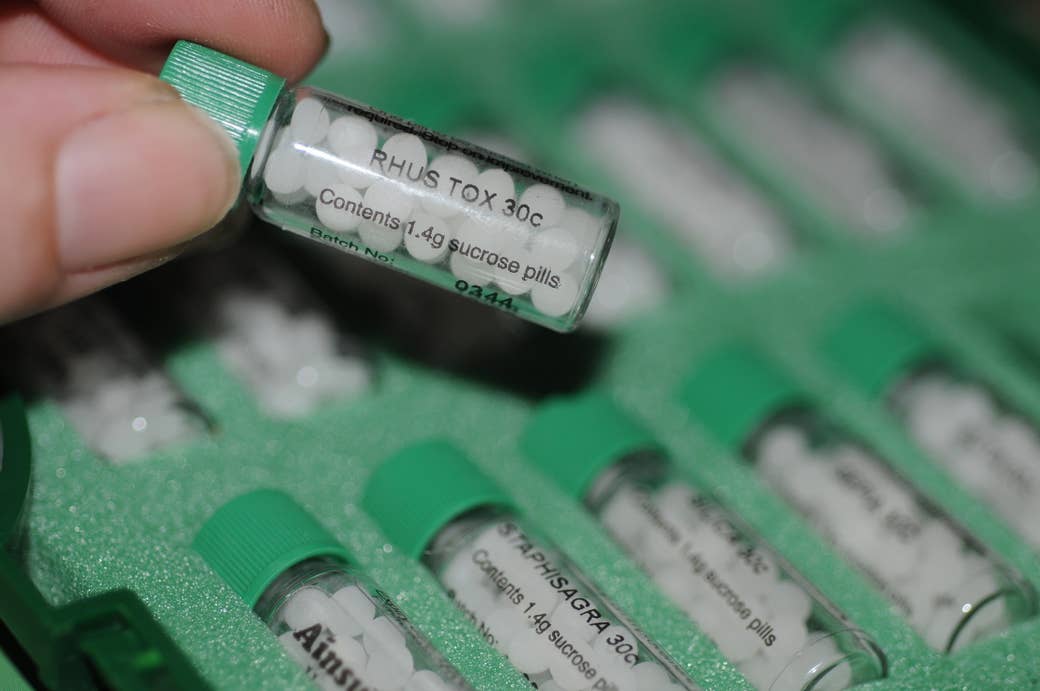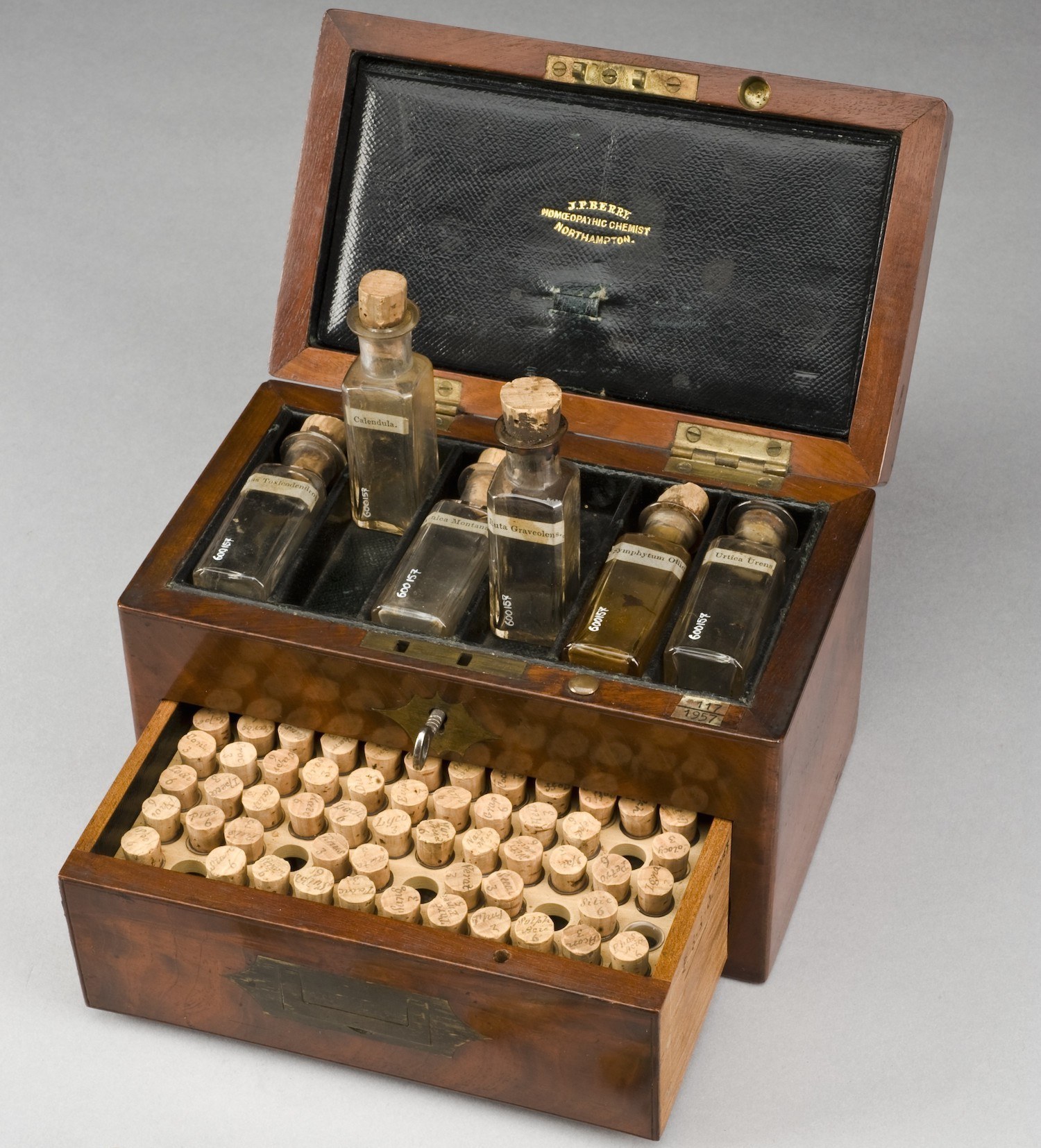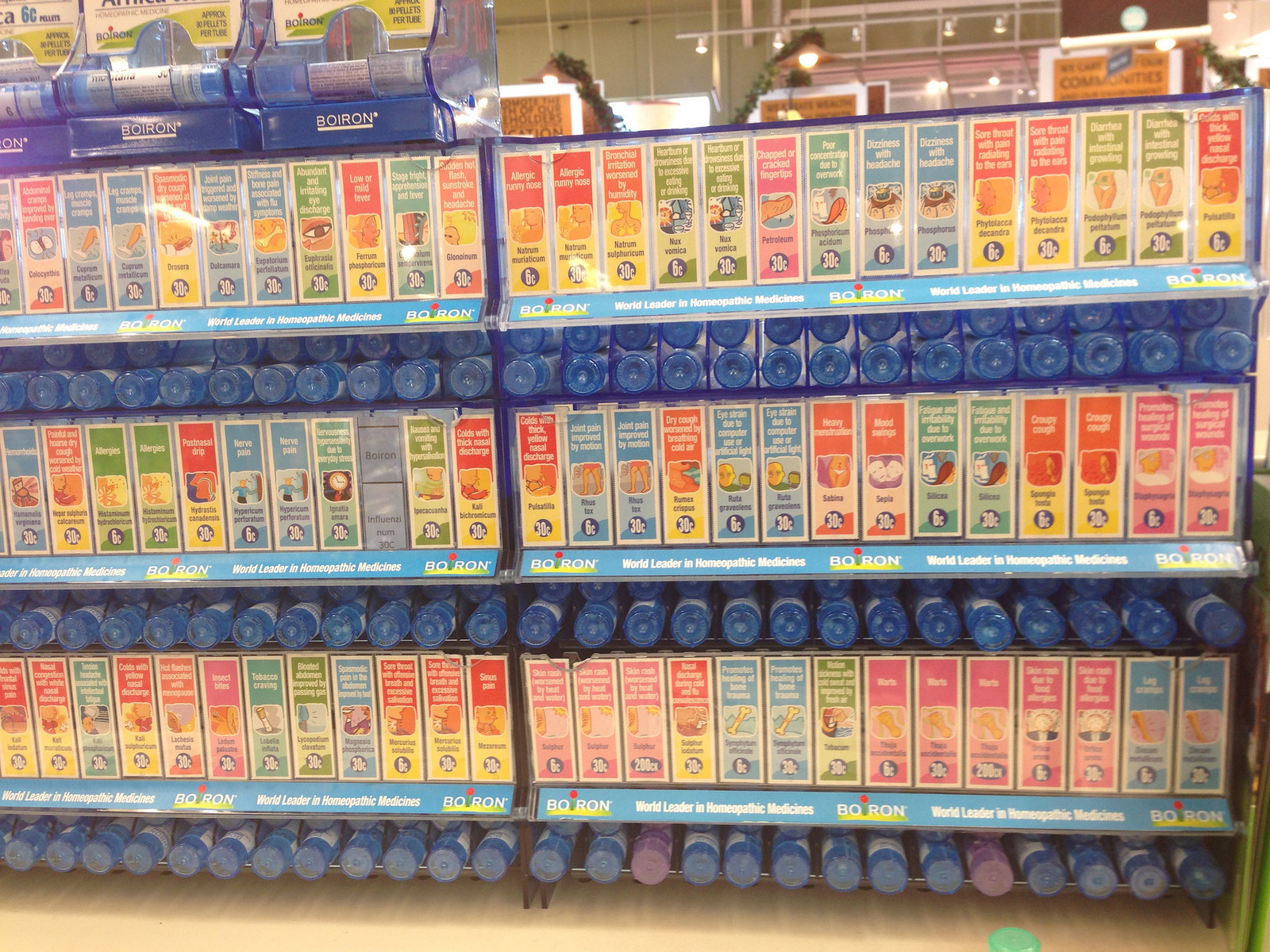
The FDA is taking aim at homeopathic remedies — pills and preparations sold over-the-counter that claim to cure diseases with tiny doses of stuff that makes people sick.
Homeopathy, which debuted in Germany more than 200 years ago, is now a $6.4 billion business nationwide, and growing. After decades of ignoring these products, U.S. drug regulators are finally asking hard questions about what has long been derided by mainstream doctors and scientists as quack medicine.
“Consumers are constantly being misled about homeopathics,” Edzard Ernst, an emeritus professor of complementary medicine at the University of Exeter in the United Kingdom, told BuzzFeed News. “They believe that they are natural, safe, and effective — none of this is true.”
That’s not just Ernst’s view. Doctors since Oliver Wendell Holmes Sr. in 1842 have mocked homeopathy. This past June, an Australian government review found “no health conditions for which there is reliable evidence that homeopathy is effective.” And in August, the U.S. CDC noted that “there is little evidence to support homeopathy as an effective treatment for any specific condition.”
Homeopathic products can also pose rare safety risks, according to the FDA. In 2009, for example, the agency received more than 130 accounts of people who lost their sense of smell after taking Zicam homeopathic cold remedies. One expert testified to the FDA that those accounts raised concerns about toxic levels of zinc.
In 2010, teething tablets marketed as being “100% natural” and having “no side effects” were linked to “reports of serious adverse events in children” such as seizures, slowed breathing, and muscle weakness, according to the FDA, sparking a recall.
Homeopathic drugs are not subject to much regulatory scrutiny. The FDA ensures that their manufacturing facilities are clean, but the products are not evaluated for their health claims. (This is even less regulation than what’s required for dietary supplements, vitamins, herbs, and minerals, which face some limits on the health claims they can make.)
But that may change. This month, both the FDA, which oversees drug safety, and the Federal Trade Commission (FTC), which oversees drug ads, will end lengthy public comment periods that followed hearings on homeopathy. The FTC smacked its sister drug-safety agency in public comments in August, calling for the FDA to crack down on homeopathic products, which “may harm consumers.”
Homeopathy advocates say they support labels for their products that would tell consumers the remedies haven’t been tested by the FDA (and perhaps remove their customary litter of inscrutable Latinisms such as “Oscillococcinum,” a supposed flu cure, that read like Harry Potter spells). Still, homeopathy's supporters say these remedies have a much better safety record than conventional drugs, along with millions of satisfied customers.
“We believe they are proven to be effective and extremely safe,” Ronald Whitmont, an internist at the New York Medical College and president of the American Institute of Homeopathy, told BuzzFeed News. The institute has been around since 1844 (longer than the American Medical Association), publishes its own research journal, and has certified dozens of physicians as “homeotherapeutics” specialists.
Noting the warnings about some homeopathic remedies issued in recent years by the FDA, Whitmont said, “we see the [federal agencies’] inquiry as a legitimate exercise into what over-the-counter homeopathic products should be supported.”

German doctor Samuel Hahnemann invented homeopathy in 1807, in a then-progressive move away from the regular poisoning and bleeding of medical patients.
“Likes cure likes” is homeopathy’s central rule. That means treatment involves extreme dilutions of something — whether animal, vegetable, or mineral — that a homeopathy-trained doctor has proclaimed produces the symptoms of an ailment.
After the 1917 Spanish flu, for example, a French physician claimed that an (imaginary) universal germ was responsible, and that it grew handily in the livers of Muscovy ducks. That led to the Oscillococcinum flu treatment, which consists of highly diluted duck liver supposedly hosting these universal germs. (The flu is actually caused by a virus too small to be seen by a microscope.) In 2009, the FDA issued a warning against advertising the treatment as a cure for the swine flu.
Another dubious tenet of homeopathy is the belief that the more intense the dilution, the stronger the ultimate product. So, a “30X” Oscillococcinum concoction, for example, would be diluted some 1,000,000,000,000,000,000,000,000,000,000 times. That’s so diffuse, it’s mathematically impossible for any molecules of the offending liver to remain in the bottle. A “200C” dilution, exponentially more diluted, is standard for the remedy, sold in sugar pellets at $15.49 for a pack of six.

“It’s a mistake to think that there isn’t anything in all homeopathic products, however,” Freddie Ann Hoffman, a former FDA official who now heads the natural health product consulting firm HeteroGeneity LLC, told BuzzFeed News.
The toxic teething tablets, for example, contained dangerous amounts of belladonna, a herb known as “deadly nightshade” that Roman emperors employed to poison their relatives.
“A lot of people, even in the business, don’t realize some of the weakly diluted products contain toxins in levels that would never be allowed in other medicines,” Hoffman said.
Indeed, even homeopaths are worried about this. “There are products out there that say ‘homeopathic’ on them that haven’t gone through the rigorous safety testing of real products,” said Whitmont of the American Institute of Homeopathy. “We would like to see them appropriately labeled.”
The remedies aren’t all just diluted with water, either. Last month, science blogger Yvette d’Entremont made news by downing, on camera, a homeopathic “constipation relief” treatment that contained alcohol at levels of 40 proof, making herself legally drunk. An NBC investigative team in Los Angeles followed up by sending in a 14-year-old to pick up some homeopathic booze. The remedy also didn’t help with constipation, d’Entremont said.

In 1938, before the advent of modern drug testing, the U.S. Congress added homeopathic remedies to the list of legal drugs nationwide. Homeopathy largely faded from medicine thereafter, dispensed in minute quantities from the cabinets of homeopathic doctors. That changed in 1988, when U.S. drug laws changed to allow these products on pharmacy shelves without a prescription, and without the efficacy evidence needed to sell other drugs. The same laws exempt homeopathic drugs from limits on alcohol, according to the FDA.
Regardless, a resurgence of interest in “natural” medical cures spurred the growth of a homeopathic remedy industry, Michael De Dora of the Center for Inquiry, a junk science watchdog group based in Washington, D.C., told BuzzFeed News.
By 2007, the CDC estimated that Americans were spending $34 billion a year on alternative medicine and doctor visits, including homeopathic products. The American Association of Homeopathic Pharmacists takes issue with market surveys that suggest homeopathic drug sales are around $6.4 billion yearly, instead claiming they are closer to $1 billion.
In any case, it’s a lot of money. “Especially with big box stores stocking homeopathic products on their shelves, the market has grown,” De Dora said. “They are on the shelves next to real medicine, they look like real medicine, and there is a lot evidence that people don’t know what they are buying.”
Homeopathy is seen in conventional medicine as a powerful demonstration of the “placebo” effect, a phenomenon recognized since 1785 in which fake pills or even fake surgery seems to help people.
So, what’s the harm? Why not let people with headaches have their placebos?
“Mainly because if you use a placebo for a serious condition, you can kill yourself with a seemingly harmless therapy,” Ernst said. The FDA warns that some homeopaths manufacture treatments for “serious or life-threatening conditions,” including AIDS and cancer.
Those risks are quite rare. Whitmont noted that homeopathic remedies have a safety record that most drugs on the shelf, painkillers for example, would envy. According to the the American Association of Poison Control Centers (AAPCC), the number of cases reported to the organization from homeopathic medicines is less than 1% of all pharmaceutical reports.
But both Whitmont and Mark Land, president of the American Association of Homeopathic Pharmacists, support FDA and FTC moves to change the labels on homeopathic drugs and advertising to acknowledge they haven’t been tested for efficacy, similar to dietary supplements.
That would still keep homeopathic drugs on pharmacy shelves, however. Homeopathy “historically relies on recommendations from highly satisfied customers to influence sales,” Land told BuzzFeed News by email. “It’s an outstanding example of the U.S. free market.”
UPDATE
This story has been updated to clarify information about the levels of zinc found in a Zicam homeopathic cold remedy in 2009.
